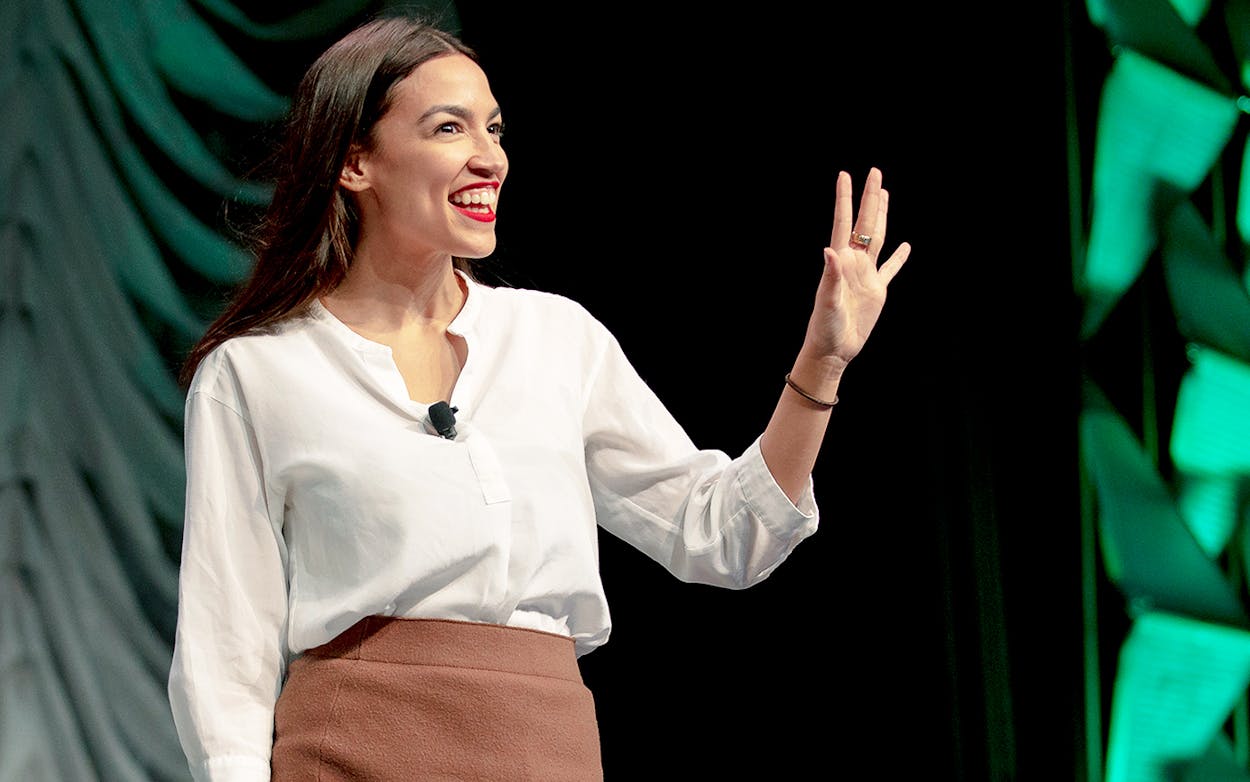Alexandria Ocasio-Cortez, a freshman congresswoman too young to run for president, reportedly drew more of a crowd at SXSW than any presidential candidate at the festival.
The 29-year-old representative, whose first year in Congress has been the subject of near-constant headlines, spoke with The Intercept’s senior politics editor Briahna Gray in one of the most highly anticipated events of the festival. Ahead of their talk, the line to get in spanned two floors of the Austin Convention Center, and after the 2,000-person ballroom reached capacity, the remaining visitors had to be directed to several packed overflow rooms. Though Ocasio-Cortez has drawn criticism, even occasionally among Democrats, she has emerged as one of the leading voices of the left, and the excitement around her solidifies her as one to watch.
Early on in her conversation with Gray, AOC embraced her label as a “radical” and condemned cynicism and “meh” attitudes in politics. “Moderate is not a stance,” she says. “We’ve become so cynical that we view cynicism as an intellectually superior attitude and we view ambition as youthful naiveté. But when we think about the greatest things we have ever accomplished as a society, [they’ve] been ambitious acts of vision.”
Throughout her talk, Ocasio-Cortez tackled a variety of subjects, from racism to socialism—even addressing surprise guest Bill Nye on how she hopes to work with other politicians on climate change.
.@AOC answers @BillNye’s questions about climate change and how to counteract fear at #SXSW #tictocnews pic.twitter.com/JKL9l2xulo
— Bloomberg Quicktake (@Quicktake) March 10, 2019
Ocasio-Cortez at one point called capitalism “irredeemable,” though tempered it with, “I don’t think our government is irredeemable … If I did, I wouldn’t have run for office.”
Addressing her 2018 campaign, the congresswoman says her win against ten-term incumbent Joe Crowley was a shock to the system. “Women like me aren’t supposed to run for office,” she said. “Young people aren’t supposed to run, working-class people aren’t supposed to run… let alone win.”
Speaking on the race and class divide in America, Ocasio-Cortez said President Trump’s tactics of “racial resentment” aren’t new, pointing to President Reagan’s idea of “welfare queens” and the inequalities for black and brown people exaggerated by FDR’s New Deal. “Wages have been stagnant for 30 years, wealth is enjoyed by only a small number of people, and the reason is not systemic inequality, it’s not runaway capitalism—the reason is, Mexicans!” she said. “They want us to fight over each other when we really need to be zeroing in on the malpractice of governance and how special interests captured the only tool we have to govern ourselves fairly and not at a profit.”
Even when discussing topics that brought up rifts between herself and more moderate Democrats, the Bronx-born politician was met with wild applause. One of these issues is the controversial abolish ICE movement.
Ocasio-Cortez expressed doubt that the Immigration and Customs Enforcement Agency could be reformed at all. “It needs to be abolished,” she said. “We have an agency that is separating children from parents and putting them in cages… Since when did it become the politically moderate opinion in America to continue caging children?”
Toward the end of the session, Ocasio-Cortez drove to the heart of the issue that led her to run when two young girls from the Radical Monarchs activist organization asked how more women of color could break into politics. She advised them to “stop trying to navigate systems of power and start building your own.” Drawing on her personal experiences, she told them, “[Women of color] are taught to put our hair back and articulate a certain way and essentially do an impression of power… essentially to act like white men. Stop trying to navigate those systems because they weren’t built for us.”
- More About:
- Politics & Policy
- Austin








